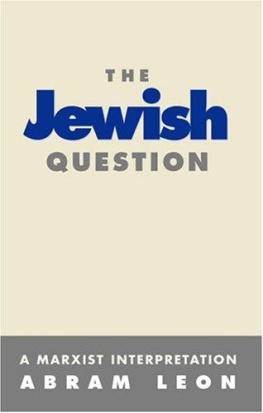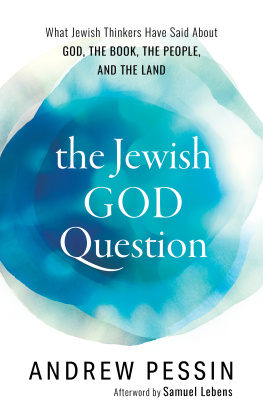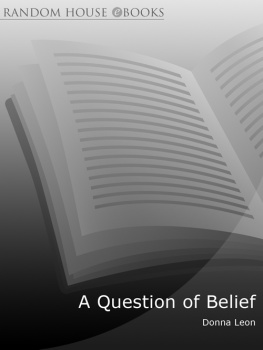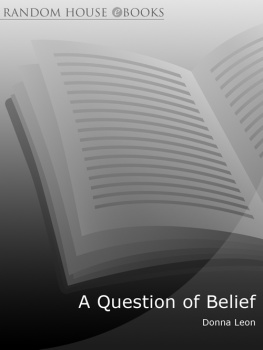Abram Leon - The Jewish Question: A Marxist Interpretation
Here you can read online Abram Leon - The Jewish Question: A Marxist Interpretation full text of the book (entire story) in english for free. Download pdf and epub, get meaning, cover and reviews about this ebook. year: 1987, publisher: Marxist Internet Archive, genre: Religion. Description of the work, (preface) as well as reviews are available. Best literature library LitArk.com created for fans of good reading and offers a wide selection of genres:
Romance novel
Science fiction
Adventure
Detective
Science
History
Home and family
Prose
Art
Politics
Computer
Non-fiction
Religion
Business
Children
Humor
Choose a favorite category and find really read worthwhile books. Enjoy immersion in the world of imagination, feel the emotions of the characters or learn something new for yourself, make an fascinating discovery.
- Book:The Jewish Question: A Marxist Interpretation
- Author:
- Publisher:Marxist Internet Archive
- Genre:
- Year:1987
- Rating:3 / 5
- Favourites:Add to favourites
- Your mark:
- 60
- 1
- 2
- 3
- 4
- 5
The Jewish Question: A Marxist Interpretation: summary, description and annotation
We offer to read an annotation, description, summary or preface (depends on what the author of the book "The Jewish Question: A Marxist Interpretation" wrote himself). If you haven't found the necessary information about the book — write in the comments, we will try to find it.
Abram Leon: author's other books
Who wrote The Jewish Question: A Marxist Interpretation? Find out the surname, the name of the author of the book and a list of all author's works by series.
The Jewish Question: A Marxist Interpretation — read online for free the complete book (whole text) full work
Below is the text of the book, divided by pages. System saving the place of the last page read, allows you to conveniently read the book "The Jewish Question: A Marxist Interpretation" online for free, without having to search again every time where you left off. Put a bookmark, and you can go to the page where you finished reading at any time.
Font size:
Interval:
Bookmark:
Abram Leon (19181944)
The Jewish Question
A Marxist Interpretation
Written: Approx. 1942 prior to Leons murder by the Nazis.
First Published: First English edition: Ediciones Pioneras, Mexico City 1950.
Source: .
Translators foreword
Writing in the shadow of Nazi occupation, the possibility of conforming his work on the Jewish question to certain formal standards of scholarship simply did not exist for the author. In making the English translation of his work, considerable time and effort were devoted to locating and identifying Leons source material and quotations, so as to eliminate, insofar as possible, this purely technical shortcoming. We were not always successful in this research project, and it has considerably delayed the appearance of the work in English, but it is hoped that even this limited success will prove helpful to serious students of Jewish history and the Jewish question.
One further word as regards quoted material: English sources have in all cases been used as they appear in English editions they are not retranslations from the French text. In all other cases, we have utilized standard English translations of foreign works, where they exist; and where the sources remain untranslated we have checked Leons text against the original French, German, or Yiddish editions.
Mexico City, 1950
ONE
The premises for a scientific study of Jewish history
The scientific study of Jewish history is yet to transcend the stage of idealist improvisation. Serious historians have boldly attacked the field of history as a whole in the spirit of Marx, and have in large measure conquered it for the materialist outlook. Jewish history, however, still remains the chosen land of the god-seekers of every variety. It is one of the few fields of history where idealist prejudices have succeeded in entrenching and maintaining themselves to so great an extent.
How many oceans of ink have been spilled to celebrate the famous miracle of the Jew! What a strange spectacle are these men who have, in order to preserve the sacred trust of their faith, braved persecutions and martyrdom, exclaims Bdarride.
The preservation of the Jews is explained by all historians as the product of their devotion through the centuries to their religion or their nationality. Differences among these historians begin to appear only when it comes to defining the goal for which the Jews preserved themselves, the reason for their resistance to assimilation. Some, taking the religious point of view, speak of the sacred trust of their faith; others, like Dubnow, defend the theory of attachment to the national idea. We must seek the causes for the historical phenomenon of the preservation of the Jewish people in their national spiritual strength, in their ethical basis, and in the monotheistic principle, says the General Encyclopedia which contrives in this way to reconcile the various viewpoints among the idealist historians.
But while it is possible to reconcile these idealist theories with one another, it is hopeless to try to find some ground for reconciling these same theories with the elementary rules of historical science. The latter must categorically reject the fundamental error of all idealist schools, which consists of putting under the hallmark of free will the cardinal question of Jewish history, namely: the preservation of Judaism. Only a study of the economic role played by the Jews can contribute to elucidating the causes for the miracle of the Jew.
To study the evolution of this question is not exclusively of academic interest. Without a thorough study of Jewish history, it is difficult to understand the Jewish question in modern times. The plight of the Jews in the twentieth century is intimately bound up with their historical past. Every social formation represents a stage in the social process. Being is only a moment in the process of becoming . In order to undertake an analysis of the Jewish question in its present phase of development, it is indispensable to know its historical roots.
In the sphere of Jewish history, as in the sphere of universal history, Karl Marxs brilliant thought points the road to follow We will not look for the secret of the Jew in his religion, but we will look for the secret of the religion in the real Jew.
It is precisely by studying the historical function of Judaism that one is able to discover the secret of its survival in history. The struggles between Judaism and Christian society, under their respective religious guises, were in reality social struggles. We transmute the contradictions of the state with a specific religion, like Judaism, into the the contradiction of the state with specific secular elements.
The general pattern of Jewish history is presented (with various slight nuances) somewhat as follows according to the reigning idealist school: Up to the destruction of Jerusalem, as late as the rebellion of Bar Kochba, the Jewish nation was in no wise different from other normally constituted nations, such as the Roman or the Greek. The wars between the Romans and the Jews resulted in dispersing the Jewish nation to the four corners of the world. In the dispersion, the Jews fiercely resisted national and religious assimilation. Christianity found no more rabid adversaries in its path and despite all its efforts did not succeed in converting them. The fall of the Roman empire increased the isolation of Judaism which constituted the sole heterodox element after the complete triumph of Christianity in the West.
The Jews of the Diaspora, in the epoch of the barbarian invasions, did not at all constitute a homogeneous social group. On the contrary agriculture, industry, commerce were widely prevalent among them. It was the continuous religious persecutions which forced them to entrench themselves increasingly in commerce and usury. The Crusades, by reason of the religious fanaticism they engendered, violently accelerated this evolution which transformed the Jews into usurers and ended in their confinement in ghettos. Of course, the hatred against the Jews was also fanned by the latters economic role. But the historians attribute only a secondary importance to this factor. This condition of Judaism continued up to the French Revolution, which destroyed the barriers that religious oppression had raised against the Jews.
Several important facts challenge the truth of this pattern:
1. The dispersal of the Jews does not at all date from the fall of Jerusalem. Several centuries before this event, the great majority of Jews were already spread over the four corners of the world. It is certain that well before the fall of Jerusalem, more than three-fourths of the Jews no longer lived in Palestine.
For the great masses of Jews dispersed in the Greek empire, and later in the Roman empire, the Jewish kingdom of Palestine was of completely secondary importance. The tie with the mother country was manifested solely in religious pilgrimages to Jerusalem, which played a role similar to that of Mecca for the Moslems. Shortly before the fall of Jerusalem, King Agrippa said to the Jews: There is no people upon the habitable earth which have not some portion of you among them.
The Diaspora was consequently not at all an accidental thing, a product of acts of violence.
2. The overwhelming majority of Jews of the Diaspora unquestionably engaged in trade. Palestine itself since very remote times constituted a passageway for merchandise, a bridge between the valleys of the Euphrates and the Nile. Syria was the inevitable highway of the conquerors ... Trade and ideas followed the same route. It is easy to see that from a very early date these regions were thickly populated, and possessed great cities whose very situation lent itself to commerce.
The geographic conditions of Palestine therefore explain both the Jewish emigration and its commercial character. On the other hand, among all nations, at the beginning of their development, the traders are foreigners. The characteristic of a natural economy is that each sphere produces everything consumed by it and consumes everything it produces. There is consequently no pressure to buy goods or services from others ... Because what is produced is consumed in this economy, we find among all these peoples that the first traders are foreigners.
Next pageFont size:
Interval:
Bookmark:
Similar books «The Jewish Question: A Marxist Interpretation»
Look at similar books to The Jewish Question: A Marxist Interpretation. We have selected literature similar in name and meaning in the hope of providing readers with more options to find new, interesting, not yet read works.
Discussion, reviews of the book The Jewish Question: A Marxist Interpretation and just readers' own opinions. Leave your comments, write what you think about the work, its meaning or the main characters. Specify what exactly you liked and what you didn't like, and why you think so.











